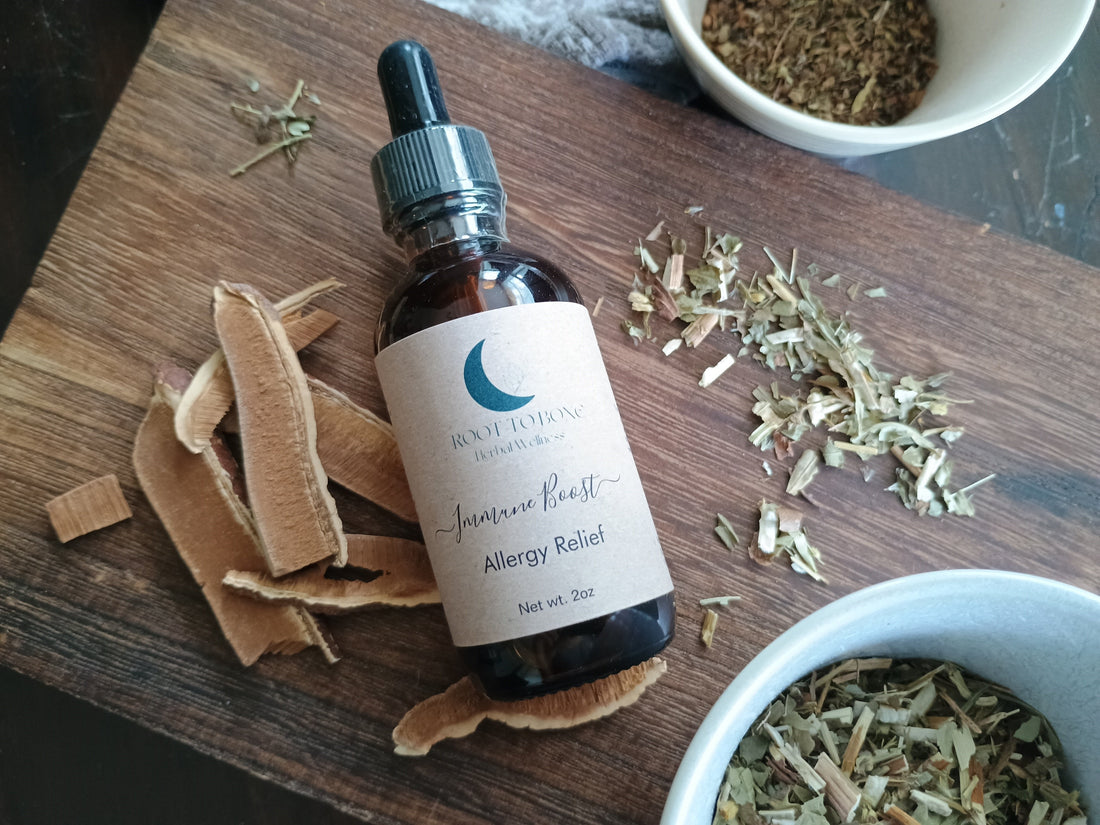
Herbs and Allergies
Many people look forward to springtime, flowers blooming and new buds emerging. The promise of new growth, warmer days, and sunshine put many in a good mood. However, for those effected by seasonal allergies, this good mood may be short lived. Allergies can be a real nuisance, causing symptoms like sneezing, itching, and congestion and may make you want to stay indoors instead of going outside to enjoy the warmer weather. While there are many over the counter medications to try, there are many herbs to help ease allergy symptoms as well.
How can herbs help with seasonal allergies?
Herbs have been used for centuries in traditional medicine to alleviate various health issues, including allergies. Certain herbs possess anti-inflammatory and antihistamine properties that can help reduce the symptoms of seasonal allergies.
Which herbs are commonly used for allergies?
There are many herbs that can help with seasonal allergies, below is just a short list of our favorites to use that are easy to find and effective, especially when used consistently and over a period of time.
- Goldenrod
- Nettle
- Reishi Mushroom
How Does Goldenrod Help with Allergies?
Goldenrod contains quercetin, a flavonoid that has been shown to have anti-allergic properties. Quercetin helps to stabilize mast cells, which are responsible for releasing histamine during an allergic reaction. By reducing histamine release, goldenrod can help alleviate allergy symptoms like sneezing, itching, and congestion. Goldenrod is rich in antioxidants and anti-inflammatory compounds, making it a popular choice for allergy relief.
How Nettles Helps with Allergies
Stinging Nettles is a nourishing herb. It's rich in protein, iron, and many more nutrients. Although it is extremely useful in seasonal allergy symptoms, it's also useful in urinary issues, skin issues, and in helping to build healthy blood and bones. While many would rather stay away from this plant due to its skin irritating sting (hence the name), when the herbs are handled and consumed dried it does not have this effect. Nettles has anti-inflammatory and anti-allergenic properties making it very useful in relieving allergy symptoms.
How Does Reishi Help with Allergies?
Reishi is a type of mushroom that has been used in Traditional Chinese Medicine for centuries. It is often referred to as the "mushroom of immortality" due to its potential health benefits. Reishi is believed to have anti-inflammatory, antiviral, and immune-boosting properties. Reishi contains bioactive compounds like triterpenes and polysaccharides, which have been shown to modulate the immune system and reduce inflammation. By calming the immune response and reducing inflammation, Reishi can help alleviate allergy symptoms and improve overall immune function. You can read more about Reishi here.
How can one incorporate herbs into their allergy management plan?
There are several ways to incorporate herbs into your allergy regime. You can take them in supplement form, drink them as teas, or use them in cooking. Our Allergy Relief blend is an easy way to incorporate these herbs into your daily routine. While herbs can be a natural and effective way to manage seasonal allergies, it's essential to remember that they may not work for everyone. Always consult with a healthcare provider or an herbalist before adding herbs to your regimen, especially if you are taking other medications.
Whether you're looking for a natural alternative to traditional allergy medications or simply curious about the benefits of herbal remedies, the above herbs are options worth exploring. With their long history of use in traditional medicine and promising research, these herbal products may offer relief for those suffering from allergy symptoms.



